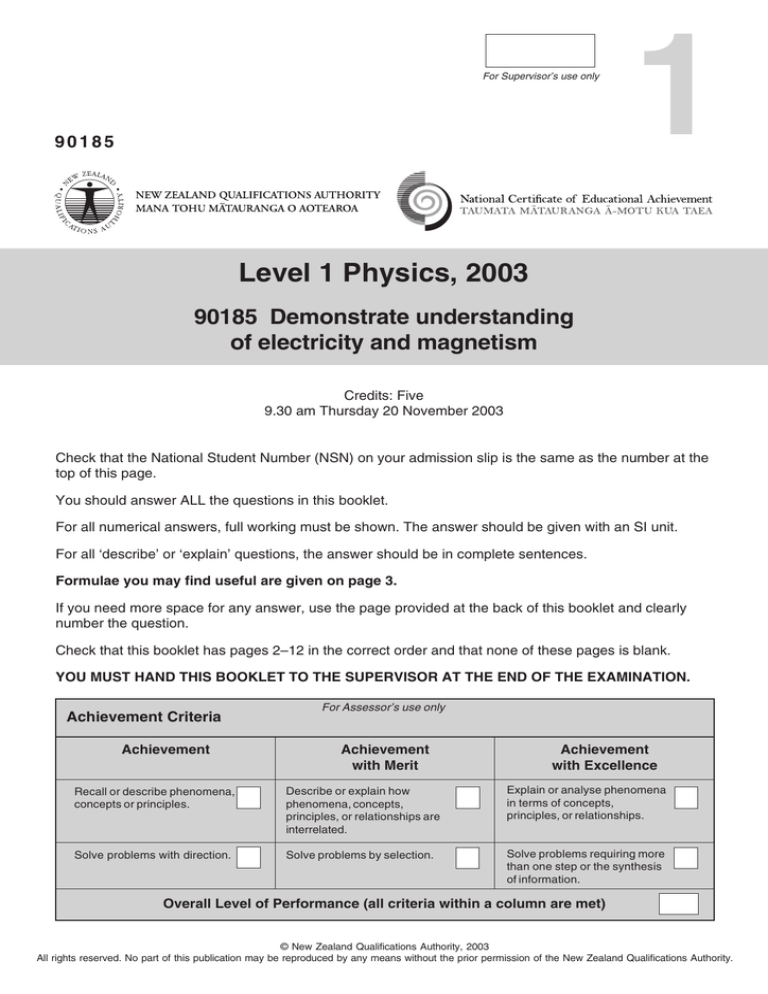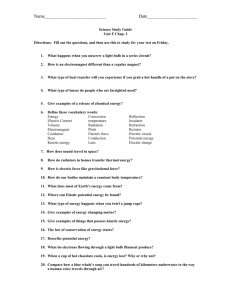
For Supervisor’s use only
90185
1
Level 1 Physics, 2003
90185 Demonstrate understanding
of electricity and magnetism
Credits: Five
9.30 am Thursday 20 November 2003
Check that the National Student Number (NSN) on your admission slip is the same as the number at the
top of this page.
You should answer ALL the questions in this booklet.
For all numerical answers, full working must be shown. The answer should be given with an SI unit.
For all ‘describe’ or ‘explain’ questions, the answer should be in complete sentences.
Formulae you may find useful are given on page 3.
If you need more space for any answer, use the page provided at the back of this booklet and clearly
number the question.
Check that this booklet has pages 2–12 in the correct order and that none of these pages is blank.
YOU MUST HAND THIS BOOKLET TO THE SUPERVISOR AT THE END OF THE EXAMINATION.
Achievement Criteria
Achievement
For Assessor’s use only
Achievement
with Merit
Achievement
with Excellence
Recall or describe phenomena,
concepts or principles.
Describe or explain how
phenomena, concepts,
principles, or relationships are
interrelated.
Explain or analyse phenomena
in terms of concepts,
principles, or relationships.
Solve problems with direction.
Solve problems by selection.
Solve problems requiring more
than one step or the synthesis
of information.
Overall Level of Performance (all criteria within a column are met)
© New Zealand Qualifications Authority, 2003
All rights reserved. No part of this publication may be reproduced by any means without the prior permission of the New Zealand Qualifications Authority.
2
Assessor’s
use only
This page has been deliberately left blank.
3
You are advised to spend 50 minutes answering the questions in this booklet.
You may find the following formulae useful.
F = BIL
V = IR
P = IV
P=
E
t
RT = R1 + R2
QUESTION ONE: Electrostatics
Sally is a manager of a dress shop. It is important that Sally looks presentable for her job. She
always brushes her hair thoroughly when she arrives at work but finds on dry days that her hair
sticks out after she has brushed it.
(a)
Use electrostatics to explain why Sally’s hair sticks out after she has removed the brush.
(b)
Sally’s hair moves towards her brush if she holds it close to her hair after brushing. Explain
why.
(c)
Why does she not have this problem on damp days?
Assessor’s
use only
4
QUESTION TWO: DC Electricity
(a)
Assessor’s
use only
Sally was setting up her clothes shop display window and wanted to place four small 6.0 V
bulbs around a sign in the window. The resistance of each bulb is 3.0 W. She sets up the
circuit shown below. The bulbs are connected to a 12 V battery.
12 V
(i)
Given that the bulbs are identical, determine the voltage across each bulb.
Voltage = ______________________ V
(ii)
Use RT = R1 + R2 + R3 + R4 to calculate the resistance of this circuit.
Resistance = ____________________ W
(iii)
Use V = IR to calculate the current in Sally’s circuit.
Current = ______________________ A
(iv)
Show that the current at which each bulb is designed to operate is 2.0 A.
5
(v)
Calculate the power at which each bulb in Sally’s circuit on page 4 is designed to
operate. Give a unit with your answer.
Maximum power = ______________
(vi)
_______(unit)
Calculate the actual power output of each bulb in Sally’s circuit.
Power = ______________________
_______(unit)
(vii) Sally found that the bulbs in her circuit were very dim. Explain what factors determine
the brightness of a bulb.
Assessor’s
use only
6
(b)
Sally tried another circuit. This is shown below. She used the same 12 V battery and
four 6.0 V, 3.0 W bulbs.
12 V
A
(i)
B
State the voltage across branch AB.
Voltage = __________________ V
(ii)
Calculate the resistance of branch AB and use this value to show that the current
through the branch is 2.0 A.
(iii)
Calculate the power output of EACH bulb in the circuit above.
Power = ______________________
______ (unit)
Assessor’s
use only
7
(iv)
Explain what would happen to the total current from the power supply if Sally added a
third parallel branch to the circuit on page 6, using two identical bulbs.
Assessor’s
use only
8
QUESTION THREE: Electromagnetism
Sally’s shop has a fire alarm installed. If the alarm is switched on a loud bell rings continuously.
The bell circuit has an electromagnet in it.
(a)
An electromagnet attached to a power supply is shown below.
(i)
Sketch the magnetic field around the electromagnet. Your sketch should show clearly
the shape and direction of the magnetic field.
Iron core
(ii)
Suggest TWO ways in which the strength of an electromagnet can be increased.
(1)
(2)
Assessor’s
use only
9
(b)
Look at the electric bell circuit below. When the switch is closed, current flows through the
electromagnet, around to the contact and back to the battery. The sound is made by the
hammer repeatedly striking the bell. The spring normally pulls the hammer away from the
bell, ensuring electrical connection between the hammer and the contact. The spring is easily
extended to allow the hammer to strike the bell and break the connection with the contact.
electromagnet
spring
fixed support for
spring and contact
contact
bell
iron hammer
(i)
Explain why, at the instant that the switch is closed, the hammer strikes the bell.
(ii)
Explain in detail the process that then causes the bell to sound repeatedly.
Assessor’s
use only
10
(c)
Sally uses a computer in her shop. A DC motor makes the computer fan rotate to keep the
computer cool. A simplified diagram of a DC motor is shown below.
5 cm
B
N
10
Brush
S
cm
A
C
D
Commutator
(i)
With the commutator in the position shown, the current in the coil flows in the direction
ABCD. State the direction of the force on wire AB.
(ii)
If the magnetic force on the wire is 0.050 N and the current through the wire is 2.0 A,
calculate the magnetic field due to the magnets.
Magnetic field = ________________
______ (unit)
Assessor’s
use only
11
(iii)
The motor can be made to spin faster.
Describe ONE change that will make the motor spin faster and fully explain how the
speed of the motor is altered by this change.
Assessor’s
use only
12
Extra paper for continuation of answers if required.
Clearly number the question.
Question
Number
Assessor’s
use only

